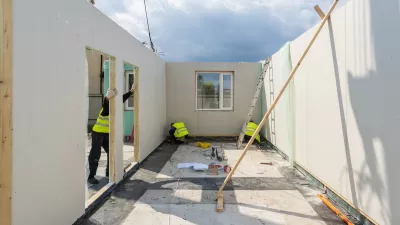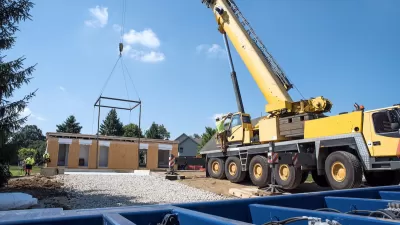Tweaks to building codes, zoning regulations, and financing mechanisms could unlock the potential of modular construction in the United States.

In an article for the Center for American Progress, Michela Zonta highlights the advantages of modular construction, arguing that encouraging more modular home building can reduce construction and housing costs, get homes built faster, and improve safety for workers.
According to Zonta, “If governments engage in coordinated initiatives at all levels to bring modular building to scale, it could also help make housing stock more resilient and sustainable relative to the challenges of climate change.”
While modular construction makes up just 3 percent of U.S. residential housing stock, it represents 45 percent of housing in Finland and Norway. “Several factors have limited the United States’ market share, including financing and payment schedules, building codes and zoning, transportation requirements, labor shortages and costs, and stereotypes.”
The article recommends that governments “Expand financial resources for the modular construction of affordable housing,” standardize building and land use codes for modular building, and incentivize more modular production through tax credits and other mechanisms.
FULL STORY: Fact Sheet: Using Modular Building To Increase Affordable Housing Stock

Maui's Vacation Rental Debate Turns Ugly
Verbal attacks, misinformation campaigns and fistfights plague a high-stakes debate to convert thousands of vacation rentals into long-term housing.

Planetizen Federal Action Tracker
A weekly monitor of how Trump’s orders and actions are impacting planners and planning in America.

In Urban Planning, AI Prompting Could be the New Design Thinking
Creativity has long been key to great urban design. What if we see AI as our new creative partner?

King County Supportive Housing Program Offers Hope for Unhoused Residents
The county is taking a ‘Housing First’ approach that prioritizes getting people into housing, then offering wraparound supportive services.

Researchers Use AI to Get Clearer Picture of US Housing
Analysts are using artificial intelligence to supercharge their research by allowing them to comb through data faster. Though these AI tools can be error prone, they save time and housing researchers are optimistic about the future.

Making Shared Micromobility More Inclusive
Cities and shared mobility system operators can do more to include people with disabilities in planning and operations, per a new report.
Urban Design for Planners 1: Software Tools
This six-course series explores essential urban design concepts using open source software and equips planners with the tools they need to participate fully in the urban design process.
Planning for Universal Design
Learn the tools for implementing Universal Design in planning regulations.
planning NEXT
Appalachian Highlands Housing Partners
Mpact (founded as Rail~Volution)
City of Camden Redevelopment Agency
City of Astoria
City of Portland
City of Laramie





























